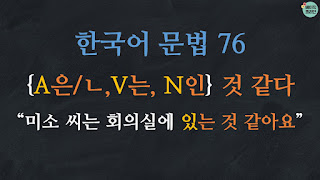V-읍시다/ㅂ시다, V-지 맙시다 Learn Korean | Korean Grammar 142
In this lesson, we will look at the expression 'V-읍시다/ㅂ시다, V-지 맙시다.' Let's learn Korean grammar 'V-읍시다/ㅂ시다, V-지 맙시다.'
If you want to watch this lesson in Korean with English subtitles, please click the link below.
🌷 Korean grammar lesson 142: https://youtu.be/bZw0we8dfL0
⭐️ Korean Grammar 142: V-읍시다/ㅂ시다 ↔︎ V-지 맙시다
우리 같이 영화를 보러 갑시다. ↔︎ 우리 같이 영화를 보러 가지 맙시다.
1. Short Conversation
- 미소: 우리 주말에 영화를 보러 갈까요?
- 지안: 좋아요. 저도 영화를 보고 싶었는데, 잘 됐네요. 우리 같이 영화를 보러 갑시다.
→ The grammar we're going to learn today is '갑시다.'
(in English)
- Miso: Shall we go to the movies this weekend?
-Jian: That sounds great. I also wanted to see a movie. Let's go to see a movie together.
2. Usage
- '읍시다/ㅂ시다' attaches after a verb stem.
- It is used when asking to do something together.
- It is used for people who are inferior to the person speaking or who are in an equal relationship. It cannot be used for superiors.
- '-읍시다/ㅂ시다' is not used with adjectives. But, it can be used with some adjectives such as '행복하다, 건강하다, 침착하다', and so on.
(example: 행복합시다, 건강합시다, 침착합시다.)
- The negative expression of '읍시다/ㅂ시다' is 'Verb-지 맙시다'.
3. Example Sentences:
✎ 미소: 미소 씨, 우리 같이 영화를 보러 갑시다. (가다 + ㅂ시다)
(Miso, let's go to see a movie together.)
- Here, '갑시다' is a combination of the verb '가다' and 'ㅂ시다.'
- Nana 'is requesting' Miso to go see a movie 'together.'
- In this case, you can use 'ㅂ시다' after the verb '가다.'- 영화를 보러 갑시다. (Let's go to see a movie.)
- And the subject of '읍시다/ㅂ시다' usually uses the first person plural '우리'. You can also omit '우리'.
- ‘읍시다/ㅂ시다’ is often used with adverbs such as '같이' or '함께'. '같이 무엇을 합시다',
'함께 무엇을 합시다' (Let's do something) - These forms are often used.
✎ 미소: 미소 씨, 점심에 (우리 같이) 피자를 먹읍시다. (먹다 + 읍시다)
(Miso, let's eat pizza together for lunch.)
- Here, '먹읍시다' is a combination of the verb '먹다' and '읍시다.'
- Nana is asking Miso to eat pizza together.
- In this case, you can use '읍시다' after the verb '먹다.' - 피자를 먹읍시다. (Let's eat pizza.)
- In this sentence, '우리' and '같이' are used as well. You can also omit both '우리 & 같이.'
Then you can also say, '미소 씨, 점심에 피자를 먹읍시다.’
4. Negative expression: V-지 맙시다.
- The negative expression of '읍시다/ㅂ시다 is 'verb-지 맙시다.' This expression is a combination of '-지 말다' and 'ㅂ시다.'
✎ 영화를 보러 갑시다. (Let's go to see a movie.)
↔︎ 영화를 보러 가지 맙시다. (가다 + 지 맙시다)
- The negative sentence is '영화를 보러 가지 맙시다.'
- '가지 맙시다' is a combination of the verb '가다' and '-지 맙시다.'
✎ 점심에 피자를 먹읍시다. (Let's have pizza for lunch.)
↔︎ 점심에 피자를 먹지 맙시다. (먹다 + 지 맙시다)
- The negative sentence is '점심에 피자를 먹지 맙시다.'
- '먹지 맙시다' is a combination of the verb '먹다' and '-지 맙시다.'
※ Combination information of ‘V-지 맙시다’ : final Consonant O&X: -지 맙시다
- Whether a verb stem has the final consonant or not, '-지 맙시다' is used for both cases.
5. Combination Information
- It attaches after a verb stem.
(1) Final consonant O: -읍시다
- When a verb stem has the final consonant, '-읍시다' is used.
- 먹다 + 읍시다 → 먹읍시다
- When you look at the verb 먹다, remove '다.'
- Then there is the final consonant before '다'.
- Then '-읍시다' is used.
- So you can say '먹읍시다.'
- 읽다 + 읍시다 → 읽읍시다
- When you look at the verb 읽다, remove '다'.
- Then there is the final consonant before '다'.
- '-읍시다' is used after that.
- So you can say '읽읍시다.'
(2) Final consonant X: -ㅂ시다
- When a verb stem does not have the final consonant, '-ㅂ시다' is used.
- 가다 + ㅂ시다 → 갑시다
- When you look at the verb '가다', remove '다'.
- Then there is no final consonant before '다.'
- '-ㅂ시다' is used after that.
- So you can say '갑시다.'
- 보다 + ㅂ시다 → 봅시다
- Let's look at the verb 보다. Remove '다'.
- Then there is no final consonant before '다.'
- Then '-ㅂ시다' is used.
- So you can say '봅시다.'
(3) Final consonant ㄹ: ㄹ drop + ㅂ시다
- When a verb stem ends with the final consonant ‘ㄹ’ delete ‘ㄹ’ and attach ‘-ㅂ시다’.
- 만들다 (ㄹ탈락) + ㅂ시다 → 만듭시다
- When you look at the verb 만들다', remove '다.'
- Then the final consonant is 'ㄹ' before '다'.
- Then, delete 'ㄹ' and then attach '-ㅂ시다'.
- So you can say '만듭시다.'
- 놀다 (ㄹ탈락) + ㅂ시다 → 놉시다
- Let's look at the verb '놀다.' Firstly, remove '다'.
- Then the final consonant is 'ㄹ' before '다'.
- Then, delete 'ㄹ' and then attach '-ㅂ시다'.
- So you can say '놉시다.'
6. Practice
✎ 우리 주말에 같이 한국어 공부를 (하다)
(Let's not study Korean together this weekend.)
→ 우리 주말에 같이 한국어 공부를 합시다. (하다 + ㅂ시다)
↔︎ 우리 주말에 같이 한국어 공부를 하지 맙시다. (하다 + 지 맙시다)
✎ 저녁에 책을 (읽다)
(Let's read a book in the evening.)
→ 저녁에 책을 읽읍시다. (읽다 + 읍시다)
↔︎ 저녁에 책을 읽지 맙시다. (읽다 + 지 맙시다)
✎ 내일 같이 게임을 하면서 (놀다)
(Let's play games together tomorrow.)
→ 내일 같이 게임을 하면서 놉시다. (놀다 (ㄹ탈락) + ㅂ시다)
↔︎ 내일 같이 게임을 하면서 놀지 맙시다. (놀다 + 지 맙시다)
#베이직코리안 #한국어문법 #Basickorean #Koreangrammar #읍시다 #ㅂ시다 #지맙시다
_basickorean.jpg)

